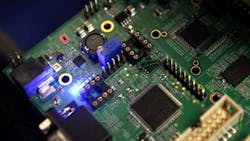STMicroelectronics is seeking a successor to Chief Executive Officer Carlo Bozotti as soon as this year, as Europe’s biggest semiconductor maker by revenue searches for a leader who can return it to growth, according to people familiar with the plans.
The board has started reviewing candidates and may bring in a replacement before Bozotti’s contract expires in May 2017, said the people, who asked not to be named because the matter isn’t public. The shares rebounded in Milan after Bloomberg reported the CEO transition, narrowing the day’s loss to 2.2 percent for a close of 4.9 euros.
While STMicro, a partnership between the French and Italian governments, is under pressure from both sides to revamp its strategy, the process is still informal and is part of a normal succession plan, one of the people said. They said Bozotti, who turns 65 in 2017, won’t extend his contract but he may be involved in training his replacement as the company looks to hire from outside its current executive ranks.
The challenge for STMicro is finding a CEO who can revitalize a company that has cut several thousand jobs in recent years amid falling sales and chipmaker consolidation. The new CEO will have to keep a tight grip on costs while spending enough to develop competitive products in emerging industries such as virtual reality and artificial intelligence.
"The new CEO of STMicro will have to align the company with the hottest technologies such as the Internet of things and wearable computers to improve sales and profit," said Carlo Alberto Carnevale Maffe, a professor of business strategy at Milan’s Bocconi University.
As the process moves forward, France’s government is pushing for STMicro to forgo its tradition of having an Italian CEO and hire externally, according to one of the people. While the French and Italian governments, which together own 27.5 percent of STMicro, are happy with the ownership structure, falling sales have prompted quarrels over strategy in the past.
A spokesman for STMicro declined to comment on the succession plans, as did a spokesman for Italy’s government. The French government declined to respond when contacted by Bloomberg.
STMicro has struggled to generate consistent profit amid waning personal-computer demand and competition from rivals including Texas Instruments Inc. Under Bozotti, the company has accumulated more than $1 billion in net losses, partly because of wrong bets on customers such as Nokia Oyj. Its 2015 revenue, at $6.9 billion, was 22 percent lower than in 2005, the year he became CEO.
Bozotti’s successor must embrace a broader vision of STMicro’s value chain and open a dialog with phone carriers and makers of so called over-the-top applications, such as messenger services, to move away from the notion that the company is just a chipmaker dealing with small commodities, Maffe said.
In January, STMicro said it will shut down its set-top-box chip business and eliminate or redeploy 2,000 positions to cut losses at its digital arm, which also makes chips used in smartphone sensors and networking equipment. The unit has been a drag on growth as Bozotti has sought new customers among carmakers and manufacturers of industrial equipment.
Fourth-quarter earnings showed a decline on all key indicators from the previous quarter: Net income dropped to $2 million, the gross margin fell to 33.5% and revenue shrank to $1.7 billion. STMicro expects further declines and has forecast first-quarter revenues will decrease by about 3%, compared with the final three months of 2015.
About the Author
Bloomberg
Licensed content from Bloomberg, copyright 2016.
